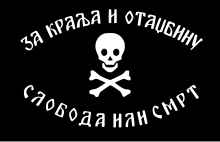The Blue Guard (Slovene: Plava garda), also known as the Slovene Chetniks (Slovene: Slovenski četniki, Serbo-Croatian: Slovenački četnici), was a Slovenian anti-communist militia, initially under the leadership of Major Karl Novak and later Ivan Prezelj. Their official name was the Royal Yugoslav Army in Slovenia.[2]
| Royal Yugoslav Army in Slovenia Blue Guard | |
|---|---|
 Chetnik flag; inscription reads: "For king and fatherland; freedom or death" | |
| Active | 1941–1945 |
| Allegiance | |
| Type | Guerrilla organization |
| Size | 300–600 |
| Part of | |
| Nickname(s) | Slovene Chetniks |
| Motto(s) | Svoboda ali smrt[1] |
| Engagements | World War II in Yugoslavia |
| Commanders | |
| 1941 | Jaka Avšič |
| 1941–44 | Karl Novak |
| 1944–45 | Ivan Prezelj |
History
editThe detachments under Novak's command were part of the wider Chetniks that included units from all over Yugoslavia that swore allegiance to Draža Mihailović. The ranks were drawn from Slovene officers in the pre-war Royal Yugoslav Army (JV). At first, the JV units in Slovenia that offered resistance were under the command of Jaka Avšič until his mid-1941 transfer to the Yugoslav Partisans. Based on direct appointment of Draža Mihailović, the commander of Slovene Chetniks was Karel Novak. Slovene Chetnik units included Styrian Chetnik detachments that were, according to some estimates, the only anti-Communist military unit that consistently attacked Axis occupiers throughout the war.[3] The detachment under Melaher's command had 200 men.[4]
In 1942, the bulk of members joined the Legion of Death.
When Karel Novak resigned in 1944, because the defeat in the Battle of Grčarice, Mihailović appointed Ivan Prezelj as commander.[5] His headquarter was with the Inner Carniola Detachment and Soča Detachments, and the Slovene Chetniks also included the Lower Carniola Detachment[6] and the Styria Detachment, commanded by Jože Melaher.[7]
References
edit- ^ Ljubičić, Saša (11 February 2014). "Slovenski 'plavi četnici' dobivaju mirovine, a vođa oporbe Janez Janša im pohodi skupove". Slobodna Dalmacija. Retrieved 14 October 2018.
Grupa slovenskih četnika uz zastavu 'Svoboda ali smrt'
- ^ "Slobodna Dalmacija - Slovenski 'plavi četnici' dobivaju mirovine, a vođa oporbe Janez Janša im pohodi skupove". slobodnadalmacija.hr (in Croatian). 2014-02-11. Retrieved 2024-08-11.
- ^ Kranjc, Gregor Joseph (2013-01-01). To Walk with the Devil: Slovene Collaboration and Axis Occupation, 1941-1945. University of Toronto Press. p. 191. ISBN 978-1-4426-1330-0.
...the Styrian formation led by Joze Melaher (alias Zmagoslav), which by some estimates was 'the only anti-revolutionary military unit that attacked occupiers with arms on a consistent basis...
- ^ Plut-Pregelj, Leopoldina; Kranjc, Gregor; Lazarevic, Žarko; Rogel, Carole (2018-02-22). Historical Dictionary of Slovenia. Rowman & Littlefield. p. 473. ISBN 978-1-5381-1106-2.
- ^ Plut-Pregelj, Leopoldina; Kranjc, Gregor; Lazarevic, Žarko; Rogel, Carole (2018-02-22). Historical Dictionary of Slovenia. Rowman & Littlefield. p. 86. ISBN 978-1-5381-1106-2.
- ^ Rebić, Đuro (1987). Špijuni, diverzanti, teroristi: ostaci kontrarevolucije u Jugoslaviji (in Croatian). Centar za informacije i publicitet. p. 81. ISBN 978-86-7125-009-2.
- ^ Griesser-Pečar, Tamara (2007). Razdvojeni narod: Slovenija 1941-1945 : okupacija, kolaboracija, državljanska vojna, revolucija (in Slovenian). Mladinska knj. ISBN 978-961-01-0208-3.
Sources
edit- Antonio J. Munoz (1998). Slovenian Axis Forces in World War II, 1941-1945. Axis Europa. ISBN 978-1-891227-12-7.
- Tomasevich, Jozo (2001). War and Revolution in Yugoslavia, 1941–1945: Occupation and Collaboration. Stanford: Stanford University Press. ISBN 978-0-8047-3615-2.